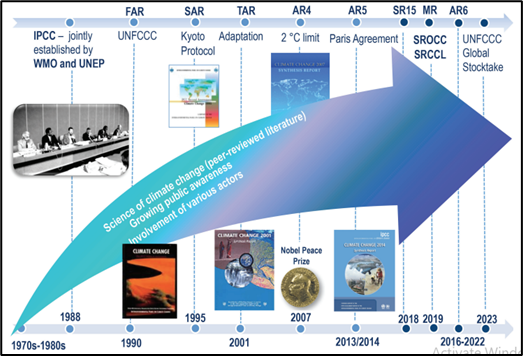Why in News?
- The Intergovernmental Panel on Climate Change (IPCC) recently released the Synthesis report - final report of the sixth assessment cycle of the UN panel.
- According to the report, climate change is a threat to human well-being and planetary health and there is a rapidly closing window of opportunity to secure a liveable and sustainable future for all.
What’s in Today’s Article?
- What is IPCC and its Assessment Reports?
- What are the Key Highlights of the Synthesis Report?
- What are the Recommendations in the Synthesis Report?
What is IPCC and its Assessment Reports?

- Through its multiple assessment cycles beginning 1990, the IPCC has collated and analysed research by scientists on
- Global warming,
- The role humans have had in exacerbating it,
- The long-term climate impact from current and future emissions and what people can do about it.
- The IPCC does not itself undertake scientific assessments but only evaluates the state of scientific evidence on various aspects of climate change.
- The current report does not weigh in on new scientific evidence but synthesises findings from three working groups and also integrates evidence from three special reports during the sixth assessment cycle, which began in 2015.
- The report was finalised at IPCC's 58th Session (13 to 17 March 2023) in Interlaken, Switzerland.
What are the Key Highlights of the Synthesis Report?
- Average temperatures had already touched 1.1°C (about 1.07°C was contributed by human activities) above pre-industrial times.
- By 2030 there is a 50% chance that global surface temperature in any single year could exceed 1.5°C.
- The world is still not doing enough to limit global temperatures from breaching the 1.5C threshold despite there being multiple, feasible and effective options to do so.
- Overshooting 1.5°C will result in irreversible adverse impacts on certain ecosystems with low resilience, such as polar, mountain, coastal ecosystems, etc.
- The climate impacts were unequally distributed with the poor and disadvantaged being the most vulnerable.
- India is among the countries that were expected to face large scale impact evident in the increased frequency and intensity of extreme weather events.
- While adaptation planning and implementation had progressed across all sectors and regions, large gaps existed.
- Certain future changes are unavoidable/irreversible but could be limited by deep, rapid and sustained global greenhouse gas (GHG) emissions reduction.
- Mainstreaming effective and equitable climate action will not only reduce losses and damages for nature and people, it will also provide wider benefits.
- This synthesis report underscores the urgency of taking more ambitious action to secure a liveable sustainable future for all.
What are the Recommendations in the Synthesis Report?
- Need for better quantification of losses and damages, which will enable policymakers to negotiate better.
- Climate justice is crucial because those who have contributed least to climate change are being disproportionately affected.
- The world must not emit more than 500 billion tonnes of carbon dioxide equivalent after 2020.
- The strategies to counter climate change needed to be rooted in diverse values, including scientific knowledge, indigenous knowledge and local knowledge.
- This approach will facilitate climate resilient development and allow locally appropriate and socially acceptable solutions.
- Apart from public finance (includes the promised but never received $100 billion), other avenues including private finance, local finance, national and international, bilateral, and multilateral finance needs to be explored.
- Need for policymakers to prioritise investments in disaster risk reduction, including early warning systems, evacuation plans, and infrastructure development to protect vulnerable populations.










